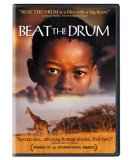| Reviews & Columns |
|
Reviews DVD TV on DVD Blu-ray 4K UHD International DVDs In Theaters Reviews by Studio Video Games Features Collector Series DVDs Easter Egg Database Interviews DVD Talk Radio Feature Articles Columns Anime Talk DVD Savant Horror DVDs The M.O.D. Squad Art House HD Talk Silent DVD
|
DVD Talk Forum |
|
|
| Resources |
|
DVD Price Search Customer Service #'s RCE Info Links |
|
Columns
|
|
|
Beat the Drum
Newsflash: Africa has a problem with AIDS
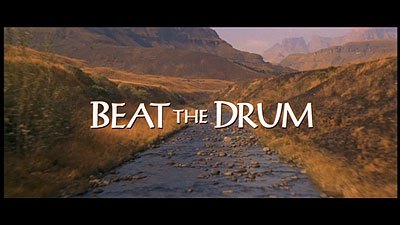
Reviewer's Bias*
Loves: Good films with a message, gorgeous cinematography
Likes: Idealism
Dislikes: Being preached to
Hates: Being manipulated emotionally, self-destructive cultures
The Movie
Being an American, it's expected that my worldview begins with America and ends with America, and my level of empathy for the rest of the big blue ball we live on is just above zero, reserved for major events featuring a cavalcade of celebrities lending their voice to a worthy cause.
To be honest, that's not too far from the truth. At least, it's true when it comes to my global neighbors who refuse to modify their behaviors in the face of overwhelming logic and undeniable danger. Thanks to the film Beat the Drum, the people of Africa are rocketing up my could-care-less chart. (And before anyone points it out, I realize the film is fictional, but when you tackle a topic like this, you carry some responsibility for the influencing the audience.)
Musa is a young Zulu boy whose world is collapsing. His mother recently died, and the same mysterious illness that killed her has now struck his father, leaving him incapacitated. The highly superstitious people of his village, including his stern grandmother, view it as a curse on the family, which leaves him as an outcast. Grandma's solution is to sacrifice the family cow, which leaves them with nothing, so Musa heads off to the big city (in this case, Johannesburg) to track down his uncle, who also left to find work. It's a very metaphorical journey to manhood for the child, who, with just the drum his father gave him, sets off on foot for the long trek.
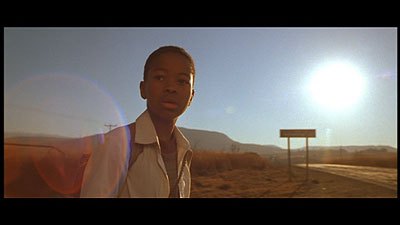
Along the way, he meets Nobe, a truck driver, who serves as transportation, friend and another link in the chain of illness that's afflicting Africa. As is apparently the norm, the truck drivers frequent prostitutes during their long road trip, which helps pass AIDS like a common cold. The attitude toward and understanding of the disease is unacceptable at this point in history, but when you can attribute everything in life to an invisible man in the sky, you can get away with a lot of ignorance. Faced with the cold, hard city and the reality of trying to survive with nothing, Musa is roughly rushed into adulthood and gets an education in AIDS and life, thanks in part to Lettie, a street urchin, who plays the role of the prostitute with a heart of gold here. Musa, played by Junior Singo with a bright-eyed optimism just a hair shy of ecstasy-powered rave kid, refuses to be dismayed though, and sees his new knowledge as a chance to bring change to Africa and overcome the misguided beliefs of his people.
In case you thought AIDS was just a problem for the brown-skinned folk in Africa, the film gives us Pieter (Clive Scott), Nobe's boss at the trucking company. When his own son contracts AIDS (How? Dunno.) he decides to try and educate his drivers to protect themselves. It's going to be a challenge though, as one scene between Nobe and his wife clearly illustrates, with one of the dumbest arguments about condoms ever captured on film. The whole Pieter subplot has little connection to the rest of the story, and truly feels like it is there purely to expand the audience for the film's message. It might be easier to accept that message if the film didn't have such a feel-good, Pollyanna ending.
As much as the film rubbed me the wrong way with the heavy-handed delivery of its message, the look is absolutely fantastic. Between first-time feature director David Hickson and cinematographer Lance Gewer (who went on to lens the acclaimed Tsotsi), the film has undeniably gorgeous visuals, including incredible landscapes and solidly constructed scenes that have energy and beauty, despite some of the ugly areas depicted. Such wonderful camera work is a great benefit to the film, as even if you don't like the story, you can just mute it, put on a CD and luxuriate the eye candy before you.
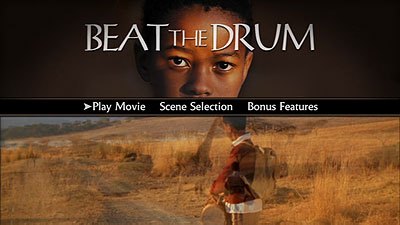
The DVD
Packed in a standard keepcase with an insert about World AIDS Day, Beat the Drum is a one-disc release. The DVD has an animated anamorphic widescreen main menu, with options to watch the film, select scenes and check out special features. The audience for this disc is going to be limited, as there are are no audio options, no subtitle choices and no closed captioning.
The Quality
The anamorphic widescreen transfer on this film is absolutely beautiful, with a crisp, clean image that boasts stunningly vivid color and strong black levels, but surprisingly, there's quite a bit of noticeable dirt and damage throughout the film. To the casual viewer, it might not be a big deal, but against the solid blue skies, the specks stood out, and grew in annoyance factor as the film went on.
The Dolby Digital 5.1 soundtrack is solid, but in no way spectacular, with clear dialogue and strong music, but don't expect anything head-turning from the mix, as the side and rear speakers are there mainly to enhance the music, and provide some light atmospheric effects. The majority of the audio comes right down the middle.
The Extras
"Beat the Drum: A South African Story" is a 16-minute behind-the-scenes featurette that uses interviews with cast and crew and on-set footage to talk about why they made the film and how they made the film, exploring the casting, production and the people, places and concepts they attempted to capture. It's a good overview of the movie, and actually conveys the point of the movie in a more concise manner.
The film's theatrical trailer, unfortunately provided in letterboxed widescreen, is the other extra, and it's an effective preview of the movie.
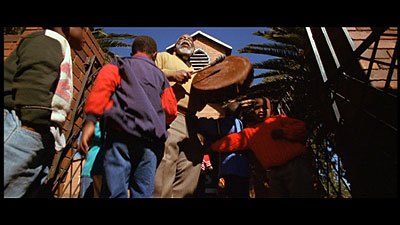
The Bottom Line
It's hard to tell a story about an issue as big and damaging as AIDS without coming off as either preachy or late to the party. After all, most people know about AIDS, and those who don't, aren't likely to learn much from a film like this. So it ends up frustrating theknowledgeable with its picture of a culture that's destroying itself with backwards, illogical and simple stupid ways of viewing the problem, while presenting truly gorgeous visuals of the African landscape. The DVD looks very nice, with the exception of some problems with dirt in the transfer, and sounds solid, though the extras are rather limited. Those interested in simply terrific cinematography and lush vistas will want to check this one out, but beyond that, it's nothing you haven't heard before, and heard in a more enthralling way.
Francis Rizzo III is a native Long Islander, where he works in academia. In his spare time, he enjoys watching hockey, writing and spending time with his wife, daughter and puppy.Follow him on Twitter
*The Reviewer's Bias section is an attempt to help readers use the review to its best effect. By knowing where the reviewer's biases lie on the film's subject matter, one can read the review with the right mindset.
|
| Popular Reviews |
| Sponsored Links |
|
|
| Sponsored Links |
|
|
| Release List | Reviews | Shop | Newsletter | Forum | DVD Giveaways | Blu-Ray | Advertise |
|
Copyright 2024 DVDTalk.com All Rights Reserved. Legal Info, Privacy Policy, Terms of Use,
Manage Preferences,
Your Privacy Choices | |||||||









